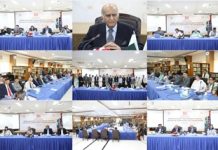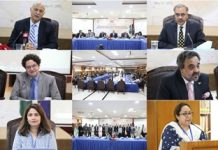Press Release
International Conference
on
Pakistan-China-Iran: A Trident of Regional Connectivity
December 19, 2017
“The age of geopolitics is over and the time has come for Pakistan to focus on geo-economics while looking for the regional options…China-Pakistan Economic Corridor (CPEC) envisages regional connectivity, therefore, we are looking forward to Iran for developing new infrastructure in the region and beyond.” This was stated by H.E. Prof. Ahsan Iqbal, Federal Minister for Interior/Planning Development and Reform, while inaugurating an International Conference on, “Pakistan-China-Iran: A Trident of Regional Connectivity”, organized by the Institute of Strategic Studies Islamabad(ISSI). He said that Pakistan and Iran need to learn from China’s approach of reaping benefits by creating peace in the region. He suggested that the three countries should create a community of shared prosperity in the region.
Earlier, in his opening remarks, Chairman ISSI, Ambassador Khalid Mahmood spoke about the goodwill that prevails among the three countries and said that the stage is set for them to achieve new milestones in economy.
H.E. Mr. Yao Jing, Chinese Ambassador to Pakistan, chaired the first session, Pakistan-China-Iran: Analyzing the Prospects of Triangular Cooperation. In their presentations over the session, Mr. Lin Minwang, Research Fellow, Fudan University, Shanghai, discussed the possibilities of the trilateral cooperation under the Belt and Road Initiative (BRI). Ambassador Alireza Bikdeli, Senior Expert at the Institute for Political and International Studies (IPIS), Tehran,emphasized that Iran and Pakistan must try to benefit to the maximum from their neighbourhood position while keeping common development plans away from securitization. Dr. Ashfaque Hasan Khan, Principal and Dean S3H, National University of Science and Technology (NUST), Pakistan, suggested a two-pronged approach to cement the trilateral cooperation: facilitating the trident through constructing regional institutions; and providing specific support to the least developed countries in the region.
H.E. Mr. Mehdi Honardoost, Iranian Ambassador to Pakistan, chairing the second session on Pakistan-China-Iran: Initiatives for Regional Connectivity, opened the floor on a very positive note that regionalism is the key principle of Iranian foreign policy and it has much more to offer in energy market and transit trade to further this initiative. Dr. Muhammad Jafar Javadi Arjmand, Assistant Professor at the University of Tehran, put forth the idea of synergizing the three formidable forces – regionalism, economic diplomacy and multilateralism – to carry through the idea of the trident. Dr. Rong Ying, Vice President China Institute of International Studies (CIIS), Beijing, touched upon the competing visions on the regional initiatives and proposed that the three countries should find the effective means to avert any possibility of confrontation through consensus. Dr. Syed Riffat Hussain, HOD, Department of Government and Public Policy, NUST, Pakistan, stressed upon the need for peace in Afghanistan, which is the key to success of CPEC or any other regional initiative.
Ambassador Khalid Mahmood, Chairman ISSI, chaired the third session, “Challenges to Trilateral Cooperation and The Way Forward.” Dr. Hadi Soleimanpour, Head of the Centre for International Research & Education (CIRE), Tehran, stated that China needs to help Iran and Pakistan with an integrated and comprehensive plan. Dr. Wang Yiwei, Director, Institute of International Affairs, Renmin University, Beijing, said that shared trinity encompasses shared interest, responsibility and destiny. Ambassador Javid Husain, former Ambassador to Iran, stated that China has a convergence of strategic interest with both Iran and Pakistan, thus providing an opportunity for close commercial and economic cooperation for the two countries which are in dire need of foreign investment.
Ambassador Khalid Mahmood, Chairman ISSI, concluded the conference by thanking all the speakers and stated that the Belt and Road Initiative (BRI) and CPEC offers a lot of opportunities for the three countries, but these are contingent upon peace in Afghanistan. He highlighted the role of Chinese commitment to the entire project and emphasized that CPEC is not just an economic venture, but geopolitical considerations must also be taken into account.












